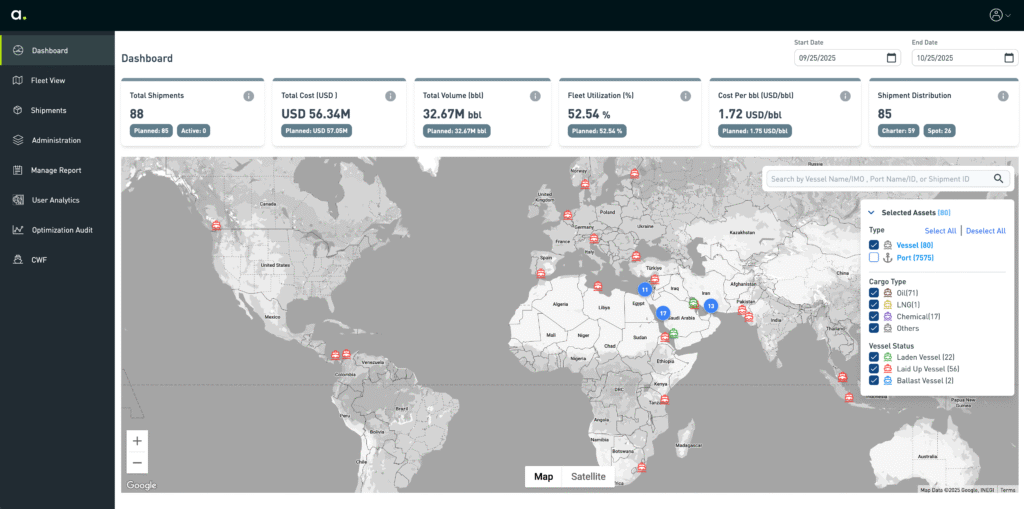Introduction—The world’s economy depends on logistics
Growth in global maritime logistics is forecast to grow at about 2.4% annually through the end of the decade according to the UN Conference on Trade and Development (UNCTAD). And growth across all global logistics is expected to increase at a CAGR of 7.2% from 2025 – 2030, according to a recent report by Grand View Research. But these growth projections have a counterpoint: The sector faces powerful headwinds in the never-before-experienced geopolitical challenges of tariff volatility, embargoes, war, and piracy—resulting in strategic gamesmanship being played out across global supply chains. And that’s all on top of more traditional challenges like wavering fuel prices (whether transported or consumed), skills availability, and supply chain sourcing and route uncertainty. These challenges and the expansion of the transport industry, while critical to meeting increasing product demand, only exacerbate the inherent complexities of effectively managing a globally distributed logistics fleet.
Maritime and terrestrial transportation and logistics are critical to global trade, with shipping alone handling over 80% of the world’s goods by volume. However, the industry faces growing challenges that include inconsistent government trade/tariff policies, operating inefficiencies, rapidly evolving environmental/emissions regulations, and the growing complexity of multi-tier global supply chains. All of these contribute to difficulties for global logistic providers in achieving profitable operations, but all are addressable using the latest AI-powered performance optimization models.
A geographically distributed and technologically diverse portfolio of shipping assets (vessels, railcars, trucks, ports, and terminals) generates immense volumes of disparate data. Conceptualizing all this data and extracting meaningful, actionable insights from it are beyond human capabilities alone. Humans and existing enterprise systems simply can’t manage at this scale and level of interdependencies.
AI tackles the challenges of modern logistics
Avathon’s Autonomy for Logistics Planning automates and optimizes fleet scheduling, eliminating manual complexities and data silos.
This industrial agentic platform enables a new era in AI-driven fleet management and unlocks unparalleled operational performance. Avathon systematically integrates all data sources—enterprise systems and third-party data—and constraints, whether onboard; weather-related; or located in ports, terminals, and management centers worldwide. With unified data, Avathon leverages AI to optimize schedules with a single click. Strategies and conditions change, and planners need recommended options—quickly. Avathon uses historical and live data to predict future outcomes that guide continuous adaptation to your fleet’s dynamic operating environment, enabling economic transport choices in real time.
Autonomy for Logistics Planning takes the next step towards autonomous operations beyond basic vessel/vehicle fleet management, providing an intelligent new decision support and execution capability set that digitizes and automates complex processes, optimizes shipping/delivery schedules, and provides accurate logistics demand/delivery forecasts. This powerful new capability set enables fleet owner/operators and shippers to manage and capitalize on volatile market conditions, achieve unrivaled operating efficiency for their businesses, better plan for materials and inbound transportation, create more accurate operating plans, significantly reduce costs, and increase revenue in a world increasingly driven by uncertainty.
Avathon’s Autonomy for Logistics Planning is built on a computational knowledge graph foundation that unifies fleet planning, scheduling, routing, management, and external rules and risk factors. Key features include:
- Integrates diverse enterprise system data sources for cargo, shipments, assets, weather, risks, constraints, and business rules across logistics operations
- Automates planning and optimization of fleet schedules and asset utilization as the planning system of record
- Develops rapid “what if” scenarios to evaluate trade-offs and risk-based resilience strategies. The preferred scenario can be seamlessly reviewed and approved—and even automated—for promotion to plan of record
- Incorporates historic performance and real-time conditions to enable proactive diagnostics and prescription to autonomously manage exceptions and disruptions
- Drives dynamic optimization with reinforcement learning instead of traditional static operations research techniques
- Dynamically evaluates critical factors across capacity, availability, compliance, and scheduling. Autonomy for Logistics Planning also accounts for fuel and maintenance costs, along with external risks such as weather, labor disruptions, and trade volatility.
Logistics fleet status is available at a glance with the platform dashboard
Avathon Autonomy for Logistics Planning includes a comprehensive integrated dashboard that provides a snapshot of the user’s entire maritime/terrestrial fleet operation, including total costs, overall fleet utilization, and cost per barrel or container shipped. The dashboard enables viewing of the entire enterprise asset base, including all vessels, ports, and terminals, enabling dynamic control to optimize routes and manage assets.

Conclusion—AI powers efficient and profitable logistics planning
Fleet owner/operators and shippers plan in some of the most challenging environments, where unpredictable weather, mechanical wear, and operational fatigue can result in equipment failures and travel/delivery delays. Achieving safe, efficient, and profitable logistics planning demands that timely and accurate decisions are made and actions taken—actions that simultaneously optimize a large number of critical and rapidly-changing variables.
The scale and complexity of accelerating global growth rates in international logistics, combined with evolving political priorities, means that the complementary relationship between AI and operational performance of logistics planners grows in importance with each day and each new delivery. As the world’s trading volume continues to grow, leveraging the power of AI will be key to ensuring that the world’s future logistics needs are met sustainably and profitably.
Learn more about Avathon’s Autonomy for Logistics Planning and the many ways it can enhance your operating performance and deliver greater reliability and profits. Click here to download our white paper on the Autonomy Platform for Logistics Planning.




